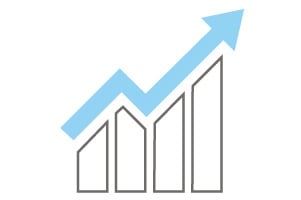Equity markets continued to rally in December, with all three major U.S. indices up for the month. The S&P 500 gained 4.54 percent, while the Dow Jones Industrial Average was up 4.93 percent in December. The Nasdaq Composite led the way as the technology-heavy index gained 5.85 percent. Falling interest rates supported higher valuations during the month, leading to positive returns for stocks.
News
Economic Release Snapshot: Mixed December Inflation Reports
Each week, we break down the latest U.S. economic reports, including what the results mean for the overall health of the economy. Here, you will find how economists’ forecasts compare with actual results, key takeaways to consider, as well as a list of what’s on tap for the week ahead.
Q4 2023 Earnings Preview: A Glass Half-Full for 2024?
Making New Year’s resolutions usually involves some level of reflection on how to be a better person and the possibilities ahead. You might write down your goals for the future, while also looking back on your accomplishments (and failures). In doing so, you may find growth where you didn’t expect it, even if it comes in the form of small wins toward your bigger goals.
Can Market Momentum Continue into the Election Year?
Today, I’d like to revisit a key point from my November blog post—the market’s run to end the year—and then cap it off with some historical election year data.
Economic Risk Factor Update: January 2024 [SlideShare]
The reports released in December showed solid economic growth to finish the year. Hiring accelerated, as 217,000 jobs were added in December against 179,000 jobs in November. Consumer confidence also improved notably, but service sector confidence fell. The yield curve inversion widened again in December, marking two consecutive months of an increasing inversion.
Navigating Uncertainty: What We’re Hearing from Portfolio Managers
When I speak to folks interested in a financial services career, I tell them the best thing about it is that every day is different. This is something that the economy and the markets have made abundantly clear over the past few years. I also often think back to a TV show from the late 1990s, Early Edition, where the main character gets the newspaper the day before it’s published and uses what he’s learned to help others. In challenging times, this might prove useful in finding investment success for clients. Alas, it’s not a resource we have at our disposal. But what we do have is insight from various portfolio managers across the industry.









 Client Relationship Specialist
Client Relationship Specialist




 Ashley has been working in the customer service field since she started her first job at age 16. For the past ten years she worked in an office setting handling accounts payable and receivable as well as some receptionist work. She is very excited to learn more about the investment field.
Ashley has been working in the customer service field since she started her first job at age 16. For the past ten years she worked in an office setting handling accounts payable and receivable as well as some receptionist work. She is very excited to learn more about the investment field. Client Relationship Specialist II
Client Relationship Specialist II Vice President of Operations and Integrator
Vice President of Operations and Integrator Wealth Advisor
Wealth Advisor Senior Client Relationship Specialist
Senior Client Relationship Specialist Senior Wealth Advisor
Senior Wealth Advisor Wealth Advisor | Director of Business Development
Wealth Advisor | Director of Business Development Wealth Advisor
Wealth Advisor Senior Wealth Advisor / Registered Principal
Senior Wealth Advisor / Registered Principal Senior Wealth Advisor / Registered Principal
Senior Wealth Advisor / Registered Principal